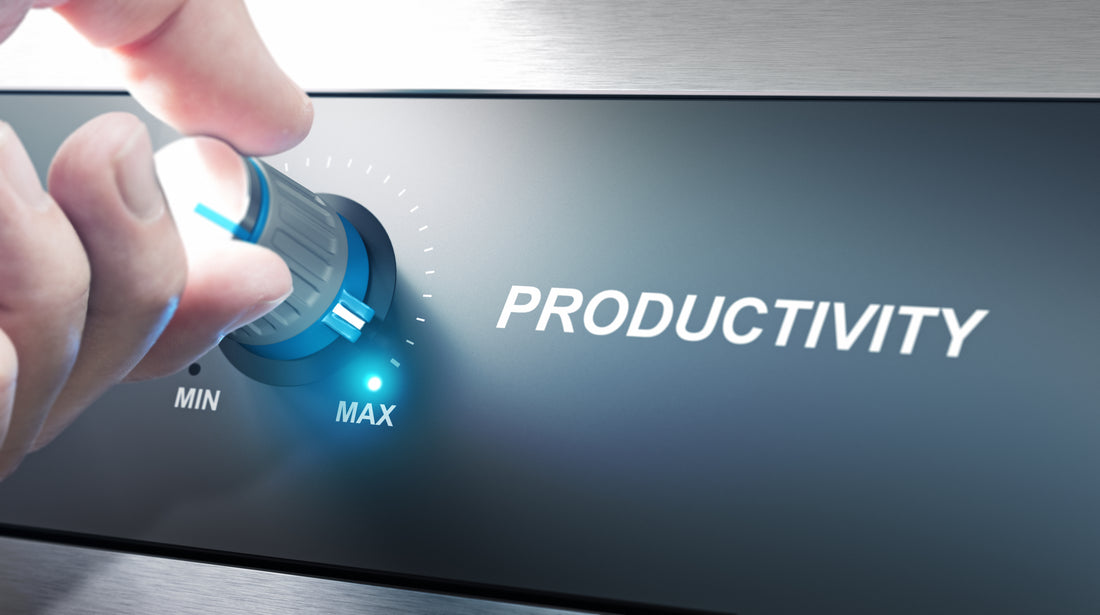14 Tips and Strategies That Will Help You Be More Productive

Key Points
- Learning how to utilise your time more efficiently and practical strategies to be more productive may benefit your general well-being.
- In essence, productivity is all about working smart and figuring out how you can spend your time well to maximise your output.
- There are multiple strategies and tactics one could adopt to become a more productive person. Fundamentally, it is all about experimenting with various productivity hacks to see what works best for you and your current lifestyle.
- Becoming a more productive person is not a trait you can acquire instantly or overnight. While certain individuals may come across as a productivity machine by having little sleep and working long hours, becoming more productive predominantly revolves around developing healthier habits coupled with an ability to organise and plan effectively.
As we all have limited time on this planet, it comes as no surprise that being productive is an essential trait to cultivate and one of the keys to attaining excellent outcomes. Fundamentally, you will learn to remain focused on the important tasks and avoid getting swayed by distractions. Not to mention, being productive in a sustainable manner will also necessitate you to take care of yourself mentally and physically.
This brings us to the question: what does “productivity” even mean in the first place?
What Is Productivity?
The term "productivity" is often used in a commercial setting, but it can be applied to every aspect of a person’s life.
In its most basic form, productivity can be defined as “the product of output divided by input”. Within a business context, the productivity of employees may be evaluated, for example, by the number of products assembled or, perhaps, the number of cold calls made. Meanwhile, productivity in an academic setting may be assessed by the number of studies completed or the number of journal articles published. However, quantifying an individual’s productivity is less straightforward, especially if the output is not tangible. Not to mention, certain industries may demand a great degree of self-motivation for one to maximise their productivity.
The Upsides of Being a Productive Person
Many advantages are associated with being a more productive individual. Theoretically speaking, a productive person gets more work done in a shorter period. Consequently, they can work efficiently and attain more goals and, subsequently, more success in the long run. As a result, many self-help content and materials tend to be centred around enhancing one’s productivity.
Besides that, people who are generally happy and healthy are often much more productive. They eat healthily, sleep better and make time to care for themselves. This enables them to remain focused and energetic throughout a long workday and accomplish much more.
Characteristics of Productive People
A multitude of factors contribute to an individual’s degree of productivity, such as personality, motivation and general energy levels. Nonetheless, productive people generally share a number of traits, including the following:
- Mentally resilient
- Focused
- Highly organised
- A go-getter
- Achievement-oriented
- Adept at remaining concentrated in spite of distractions
- Practise self-care routines.
On that note, if you are looking to become more productive, these are some of the traits you should emulate and eventually develop to get the most out of your time.

Basic Principles of Productivity
Productivity level, in general, is a highly personal metric as everyone is built differently. However, there are three core principles that everyone needs to appreciate if they are looking to build a healthy and sustainable productivity regime. These include the following:
Having Faith in the Process
In general, it is unrealistic to expect working habits to alter overnight. Instead, focus on making minute yet significant changes in the way you work so that these tiny habits will gradually build toward substantial changes in your productivity levels. In the meantime, experiment with a few productivity methods that interest you and slowly introduce more as you get a sense of strategies that work for you.
Hold Yourself Accountable for the Results
Crucially, it does not matter whether you decide to set your own deadlines, declare your personal goals to the entire world or get an accountability partner to conduct regular check-ins with you; aim to find a way to push yourself to get the task done properly.
Be Kind and Forgiving to Yourself
At the end of the day, you must acknowledge that you are only human. Thus, you need to accept that there will be times when you make a mistake, get distracted, miss a routine or have a terrible day. What’s important is that you pick yourself up quickly from your mistakes rather than dwell unnecessarily over them.
Practical Tips on How You Can Improve Your Productivity
There are a number of good productivity tips that one could consider introducing to their daily schedule, though in general, it would be best for everybody to observe what does and does not work well for them to ensure that productivity remains sustainable for the long term.
Having said that, some notable productivity tips and strategies include the following:
Take B・SYNC ON Tablets to Help You Wake Up Early
Simply put, getting out of bed early provides you with more time to work, thereby increasing your productivity. However, not everyone is a morning person, so waking up at the crack of dawn may be tricky for certain individuals.
If you want to wake up early but struggle every time you try to get out of bed even a little earlier than usual, you should consider trying B・SYNC ON. In essence, B・SYNC ON is the world’s first-ever wake-up pill that has been clinically tested to help you in your waking process. The tablets are filled with four all-natural active ingredients, namely zinc, caffeine, and vitamins B5 and B12, that are released seven hours later after consumption. With that, these core substances positively influence the cortisol levels within your body to support your natural wake-up process, helping you to wake up feeling refreshed and full of energy and be ready to tackle the day. Shop B・SYNC ON now!
Avoid Multitasking
Essentially, attempting to do multiple things at once is often a tempting move as it gives the illusion of being productive. However, this practice often produces few optimal results. Alternatively, by concentrating on getting one task done at a time, you have a much higher chance of getting it completed to a better standard and within a shorter amount of time, allowing you to proceed seamlessly to the next task.
Focus On Work That Truly Matters
Even though most won’t admit it, there are many low-level tasks that many tend to get overly obsessed with, such as clearing their emails or taking the perfect meeting minutes. These actions are simply ways for people to avoid doing the real work. Hence, it is important for one to recognise the truly important tasks that need to get done so that one can be as efficient and productive as possible.
Establish Small and Achievable Goals
In most cases, having a large project or job to complete can be an overwhelming experience for many. Plus, most people have a tendency to underestimate the amount of time they will need to complete it. With that, you could consider breaking work down into various bite-sized tasks so that each milestone does not appear overly intimidating.
Schedule In Regular Breaks
Introducing regular breaks into your schedule might appear as counterintuitive advice, especially when we are hoping to maximise our productivity levels. However, taking frequent short breaks lasting between 10 and 15 minutes is actually vital in helping us lower our stress levels. In essence, utilising this time to step away from your work desk allows you to clear your mind and potentially return to work with newfound motivation. This, in turn, aids us in boosting our productivity levels.

Find Ways to Fight Procrastination
Procrastinating on your work until the very last minute is never a good idea, and it can take a toll on the quality of your output and your productivity levels.
If you are somebody who struggles with procrastination, consider trying out the five-minute rule, whereby you basically promise yourself to spend merely five minutes to complete a task. Doing this can build momentum for you to work on an outstanding piece of work. As a result, the motivation to continue working may prompt you to finish the entire task altogether.
Incorporate Time-Blocking Exercises
Time blocks are typically segmented into 60 or 90-minute timeframes and are one of the most popular and established productivity hacks. You create time blocks within your schedule to commit a certain amount of time to work on a specific task.
Seek Help When You Need It
Put simply, you can enhance your productivity levels by being self-aware enough to know when and how to ask for help. On that note, by delegating certain responsibilities to the right individuals, you free up some of your time to work on tasks that will genuinely move the needle toward achieving your work goals.
Limit Distractions
It is fairly normal for one to get distracted, and concentration is not always something that comes naturally. Nonetheless, developing the ability to focus amidst distractions is a crucial skill that you can learn, and there are many strategies for cultivating that ability. Switch off your phone notifications, set your phone to aeroplane mode or install productivity apps like Freedom.
Complete the Hardest Task First
It may often be tempting to focus on small wins as opposed to working on challenging and time-consuming projects. Nevertheless, choosing to tackle the hardest tasks first often elevates your motivation, allowing you to work on simpler tasks later in the day. Consequently, this may help increase your motivation levels to get everything done.
Group Similar Tasks Together
We introduce friction and break our focus whenever we switch between different types of work. Thus, by reducing the frequency of switching between different tasks, we naturally group projects of a similar nature together.
Establish Clear Boundaries
In essence, setting boundaries on your time helps prevent you from feeling overwhelmed. It is imperative to know when to say no to certain projects and focus on the ones at hand as part of making sure you do not compromise on your productivity levels and quality of work.
Figure Out When You Are Most Productive
Everyone is different. Certain individuals work best at the crack of dawn, while others may work best in the middle of the night. With that, identifying when you work best and planning your day to suit that is an excellent tactic to maximise your productivity.

Declutter Your Work Environment
Your work environment plays a significant role in influencing your productivity levels, and having a clean and tidy physical space can give you greater clarity and focus on completing the tasks at hand.
Can Someone Be “Too Productive”?
Toxic productivity, defined as the drive to be constantly productive while sacrificing all other pursuits, often plagues go-getters. Fundamentally, toxic productivity can be considered modern terminology for “workaholism” and has been on the rise as the lines between work and home life began to blur during the COVID-19 pandemic.
Thus, just like consuming alcohol, it is imperative for you to identify your limits and know when it is time to take a break. This, in turn, keeps your anxiety and stress levels in check, minimising the risk of severe burnout in the long run.
Concluding Thoughts
All in all, there are many benefits associated with being more productive, such as attaining your goals, getting more stuff done and enjoying a greater sense of accomplishment overall. Not to mention, there’s a lot of practical advice and strategies you can adopt to maximise your productivity, including taking care of yourself, learning how to prioritise your time effectively, using the right productivity tools and setting up a solid work plan.
Nevertheless, you are still strongly recommended to concentrate on incorporating one or two of these productivity tips so that the entire process does not overwhelm you. It is also imperative to bear in mind that developing productivity skills is not instant, so making small adjustments to your life is all you need to create lasting changes. In essence, you simply need the discipline and patience to do so. Therefore, remember to be kind to yourself, stick with the process amidst the rough patches and keep on trying until you succeed.
Frequently Asked Questions (FAQs)
How do you consistently stay productive?
Having a clear idea of what to do and when to get it done can assist you in remaining on top of your work. To do this, ensure your targets follow the “SMART” goals rule (i.e., they are specific, measurable, achievable, relevant and time-bound). This allows you to break them down into smaller and more manageable chunks that you can complete seamlessly. Setting up a sustainable routine and adhering to it as much as you can is also a pragmatic strategy to consider. This essentially means establishing specific times and days to complete certain tasks – whilst scheduling breaks at regular intervals. In the meantime, should you happen to find your concentration levels fading, practise a few simple mental exercises or go for a short walk to clear your mind.
What are the basic principles of productivity?
The three basic principles of productivity are trusting in the process, holding yourself accountable for the outcome, and being kind to yourself throughout the journey to becoming more productive.
What are some traits of super-productive people?
Productive people come in many different forms, but some of the common traits shared by all of them include a goal-oriented mindset, being focused and organised, possessing grit and determination amidst adversity, and being capable of managing distractions regardless of how they surface.







